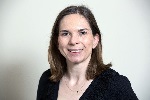A zoom into basic clinical radiobiology – report on a course like never before - PDF Version
12-16 September 2020, online
Anticipation, worry and excitement fill me as I await the connection to the Zoom room that will become my home for the next five days. It is a Saturday morning, 12 September 2020, and after months of preparations, the Basic Course in Clinical Radiobiology is about to start.
There is anticipation at the prospect of discussing the key radiobiological concepts that underpin the measure of success or that explain the threat of failure for the increasing number of patients who choose radiation therapy to treat their disease. The worry is that the online format will affect the exchange between a dynamic faculty and a spectrum of international radiation oncology professionals. The excitement is because, for better or worse, the course is about to happen, and I am about to make my debut as its new teacher.
As the connection finalises, the friendly faces of Professor Mike Joiner and my fellow teachers– Professor Vincent Gregoire, Professor Karin Hausterman, Professor Marianne Koritzinsky and Professor Rob Coppes – who are now all “panellists” in this online environment, appear on my screen beside the list of the 132 international participants who are joining us. We cannot see them, but welcoming messages fill the chat box as Professor Joiner officially opens the course and sets the tone for what is about to become a rich, fun, and interactive learning environment over the next five days.
Radiobiology is an important pillar in the practice of radiation oncology, but one that many health care professionals may be afraid to scrutinise. Thoughts of cells, DNA damage, molecular pathways, mathematical modelling and tissue kinetics may be far removed from the daily focus on the clinical management of patients. Professor Gregoire quickly reassures us that the next five days will be well spent as in his opening lecture he displays scans of patients with unexplained recurrences of cancer. Once Professor Koritzinsky has calmly explained the cancer hallmarks and the molecular basis of cell death, and Professor Hausterman has outlined the principles of tumour growth, our audience has settled and is ready to embrace the mathematical modelling of cell survival with Professor Joiner. He demonstrates that two plus two is not equal to four when it comes to radiation cell kill. By the end of that first day, everyone can navigate the toxicity-free curves and begin to grasp the time scale of normal tissue responses with Professor Coppes.
As we say our goodbyes that evening, I am sad that we are unable to debrief at a welcoming evening reception, and it feels strange to step back immediately into the reality of my home office and family life. But over the next few days, this transition becomes the norm and I do feel connected with this virtual community. The teachers convey their enthusiasm, the participants share their doubts, the exchange is real. My first lecture is supplemented by polls and I quickly realise that, although we are not in the same room, our participants are very much present. Discussions can happen online; knowledge can be efficiently transferred.
Online learning has been forced upon us. Some hate it, some embrace it. It will never replace the human side of face-to-face teaching: the atmosphere in the room, the non-verbal clues that the material is being understood or that the audience may be bored. But feedback from our participants is excellent. The humour of Mike Joiner is not lost, the charisma of Vincent Gregoire and Karin Hausterman, the clarity of Marianne Koritzinsky, the off-the-press updates of Rob Coppes’ work – these are all noted by the participants. My attempts to explain dose-response curves, linear energy transfer (LET) and dose-rate effects in an interactive manner are appreciated. All of this is possible through flawless monitoring of the practical implications of a Zoom delivery by Mieke Akkers, administrator for the European SocieTy for Radiotherapy and Oncology (ESTRO).
We do not know what the future will hold; whether online learning will become the new norm, or a more regular feature of the ESTRO School, but in our case, it has been a success. This experience has generated new ideas, and the next iteration of this Basic Course in Clinical Radiobiology, whether online or face-to-face, will benefit from this set of circumstances and contribute to ESTRO’s vision of “Radiation Oncology; optimal health for all, together”.

Dr Laure Marignol
Teacher, Basic Clinical Radiobiology ESTRO Course
Associate professor, radiobiology
Discipline of Radiation Therapy
Trinity College Dublin
Dublin, Ireland
marignl@tcd.ie